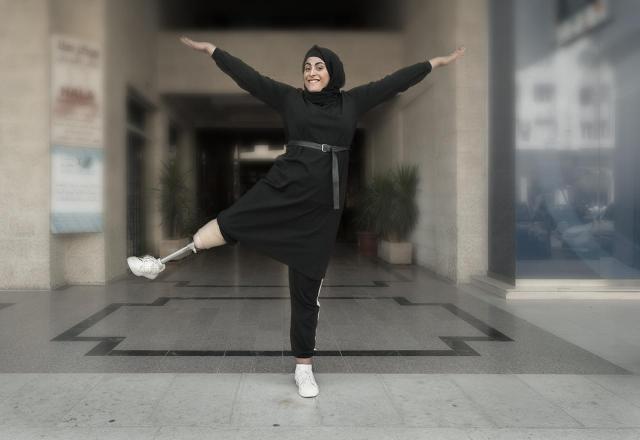
Eman Al-Shayyab
Eman Al-Shayyab was ten years old when she lost her right leg in a bombing around her home in the city of Dara’a, Syria in 2013. Eman lived with her parents and fourteen siblings and was going to school. Her parents worked in agriculture and the clothing industry. One day, Eman and her family heard planes overhead and rushed out of their home to escape the ensuing conflict. The last memory Eman has of that day is of being hurled through the air after a loud blast from a missile strike. Two of her brothers were killed in the blast and the rest of her family suffered mild to moderate injuries. Eman and two of her sisters suffered more severe injuries. For Eman this meant the eventual loss of her right leg. After the bombing, Eman and her sister Enas were moved to the Za’atari refugee camp in northern Jordan for medical treatment. To this day, neither Eman nor Enas has seen their family members in person since their departure from Dara’a.
A year later, Eman and her sister left the Za’atari refugee camp and moved to the Al Bader Syrian refugee rehabilitation center in Amman. It was there that Eman received her first prosthetic leg from ADT (Asia Development Training), a Jordanian NGO supported by the US Department of State’s Bureau of Weapons Removal and Abatement. Eman is one of many beneficiaries who receives services from ADT at the Sir Bobby Charlton Rehabilitation Centre in Amman. ADT provides physical and psychosocial rehabilitation services to Jordanian citizens and refugees from neighboring countries free of charge, using what it calls a “person-centered” approach. Using a person-centered approach means considering beneficiaries themselves first–instead of quotas–and designing rehabilitation services based on their unique situations to address their most pressing needs. ADT offers services that address both physical and psychological trauma including distribution of orthotics and prosthetics, counseling services, expressive arts therapy, and physical therapy. ADT also trains new prosthetic technicians and physical therapists to address the need for building the rehabilitation capacity in Jordan. Many of the trainees are Syrian refugees who go on to work throughout the Middle East and Europe. Beneficiaries like Eman normally spend considerable time at ADT while they undergo trauma services and readjust to their new situations.
In addition to receiving a prosthetic leg, Eman has participated in ADT’s Wings of Peace program, a child trauma program developed in 2015 that is supported by the Dorothea Haus Ross Foundation. Wings of Peace uses expressive arts and group counseling as part of their person-centered approach to address psychological trauma in refugee children in Jordan. Through Wings of Peace, Eman has taken up painting and drawing, offering her a creative, non-verbal outlet for coping with trauma. Eman also takes part in ADT’s leadership development program and is now a mentor for young children who have had similar injuries and experiences. Wings of Peace has since been replicated and is now also running in Mosul, Iraq.

Injuries like Eman’s are common among refugees living in Jordan who have fled from violence to begin a new life. According to UNHCR, Jordan hosts the second highest number of Syrian refugees per capita in the world. The challenges that refugees face are immense, particularly for those who have been injured. Addressing physical and psychological trauma, while simultaneously finding a safe place to live and adjusting to life in new country puts refugees at high-risk of homelessness and violence. Most refugees have multiple needs that must be met before they can begin their recovery. ADT’s person-centered rehabilitation philosophy is meant to recognize each person’s unique situation. Identifying and prioritizing those needs is a necessary step toward mitigating physical and psychological trauma and helping people build a new life in another country.

Person-centered services are the opposite of one-size-fits-all services that focus on delivering a single service to a maximum number of people. To be sure, there exist many situations in which the latter is best, as with the case of epidemics where maximum distribution of a vaccine is needed. But dealing with refugee crises is a different situation since many needs must be addressed at once. Refugees who have lost limbs typically require more than just a new prosthesis or physical rehabilitation. Other services like counseling and education are often equally necessary as physical rehabilitation. At ADT, child refugees often participate in expressive arts therapy and youth leadership training while receiving counseling and physical rehabilitation. For Akram Ramini, ADT’s Executive Director, “it is important to take the long view by helping people not only recover from their wounds but to lead meaningful and productive lives, and to become future leaders who will advocate for victims of conflict throughout the world.”
After finishing high school in 2019, while still living in the Za’atari camp, Eman was awarded a scholarship at Zarqa University, where she now studies translation. She is currently in her second year and is no longer living in a refugee camp. ADT has provided her with a laptop and helps her with the cost of college.
